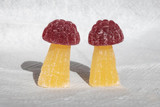A Complete Insight into CBN
Cannabinol (CBN) may be a minor cannabinoid in hemp plant, but its popularity has soared over the last few years due to its unique effects that have appealed to individuals with various daily needs. Now, you can find a nice array of CBN-infused hemp products that offer concentrated levels of the compound, to ensure that its properties can make a genuine impact on one’s day to day life. But, despite the rising popularity of this cannabinoid, there are still a lot of people out there who know little about it, and in fact, might be missing out on its exciting capabilities.
What Exactly is CBN?
Cannabinol is one of over 150 cannabinoids found in the hemp plant, but it exists in very low levels in the plant. CBN’s predecessor is actually delta 9 THC, which oxidizes in aged plant material and partially converts into CBN. If you’re familiar with delta 8 THC, you know that this cannabinoid also results from oxidized delta 9. But, unlike delta 8, CBN will not get you high.
Each are also associated with the endocannabinoid system (ECS):
- Delta 8 is linked mainly with CB1 receptors in the brain and nervous system,
- CBN seems to have a particular fondness for CB2 receptors in the immune and digestive systems.
Due to the manner in which CBN’s naturally produced, its levels are lower in fresh plants compared to plants that have matured or been exposed to ultraviolet light for a considerable length of time. Basically, this makes the process of isolating and extracting it far more tedious than the process associated with cannabidiol (CBD).
The History of CBN
Cannabinol was, in fact, the first cannabinoid to be isolated, way back in 1899. Chances are that its discovery resulted from the poor storage of cannabis which converted a good deal of tetrahydrocannabinol (THC) into CBN. This may also explain why its discovery wrongfully led researchers to conclude that cannabinol was the active compound in cannabis responsible for its psychoactive effects. Interestingly, it would take about half a century for researchers to isolate another cannabinoid: CBD.
What are the Properties of CBN?
Despite being the first cannabinoid to be given a name in the cannabis plant, studies on cannabinol’s effects are surprisingly lacking. There just hasn’t been a strong interest in the potential properties of the cannabinoid until recently, especially when compared to CBD and THC. This doesn’t mean that there haven’t been studies on the potential effects of cannabinol – it just means that we don’t yet know the full scope of what the cannabinoid is capable of.
#1: Potential Sleep-Enhancing Agent
One of the first studies on cannabinol pertained to its effects on sleep, showing that the cannabinoid may have some type of sedative-like effect. Since this study was released, there has been criticism that the study was too small, and that its methods were flawed, meaning that we cannot view it as conclusive evidence that the cannabinoid actually offers sleep-promoting activity. But, the fact of the matter is that CBN’s primary appeal is its potential effects on sleep, since the majority of cannabinol products on the market are intended for bedtime. Many individuals use CBN specifically for this purpose, and are satisfied with the results.
#2: Potential Stress Relief
The same properties associated with sleep explain why many people note a relief in stress after taking cannabinol. It may have some sort of mellowing effect on neurotransmitters associated with the stress response and mental overactivity. More studies need to be performed to determine the exact mechanisms that could play a role in reduced stress through CBN administration.
#3: Potential Neuroprotective Properties
Early stages of research are suggesting that cannabinol may offer unique neuroprotectant properties that could play a role in the development of neurodegenerative diseases. One study tested the effects of cannabinol on rats with ALS, finding promising results. Neuroprotectants strengthen neurological function in a way that can be extremely valuable to individuals with various neurological disorders.
#4: Potential Anti-Inflammatory Activity
Like many cannabinoids, cannabinol seems to offer distinctive anti-inflammatory properties to the body, and these properties may be particularly pronounced due to the cannabinoid’s affinity for CB2 receptors found in the immune system, which control the body’s inflammatory response. In particular, cannabinol has been found to reduce allergen-induced mucus production in the airways and may offer some level of relief from inflammation-associated pain.
#5: Antibacterial Agent
Studies have suggested that cannabinol possesses strong antibacterial activity along with THC, offering potentially powerful antimicrobial properties that could be useful in all kinds of applications.
What is the Psychoactive Nature of CBN?
To the surprise of many people, cannabinol does in fact have psychoactive properties, but in order to cause a “high” to occur, an extremely large concentration of cannabinol would have to be consumed. It gets its psychoactive properties from its predecessor, delta 9, but retains them far less effectively than delta 8. In fact, when taken in combination with THC, CBN might offer enhanced feelings of euphoria. In short, the CBD products available on the market are not intoxicating.
Types of CBN Products
Since cannabinol has become an extremely sought-after cannabinoid, and despite its naturally low prominence in the raw plant material, CBN-specific products exist on the market as the result of the development of concentrated CBN isolates created using advanced extraction techniques. They come in various forms that users can explore according to their preferences.
- Vapes: CBN vapes refer to vaping products that contain active levels of cannabinol. Usually, these vapes consist of a full spectrum hemp extract that’s enhanced with a pure cannabinol isolate in a concentration high enough to deliver the cannabinoid’s effects in a way that’s noticeable. You can find pre-filled CBN vape carts that attach to 510-threaded vape pens, or disposable devices that arrive fully assembled, charged and filled with e-liquid, requiring less maintenance. All vaping products deliver fast-acting, potent effects due to the high bioavailability of inhaling cannabinoids, with effects wearing off between 1 and 2 hours later.
- Tinctures: CBN tinctures are bottled oils consisting of cannabinol extract diluted in a carrier oil. You can choose from various milligram strengths and apply the formula to the sublingual tissue below the tongue. This allows the cannabinol to take effect within somewhere around 30 minutes, lasting for about 4 or so hours.
- Edibles: CBN edibles allow you to ingest the cannabinoid, which can offer up to 8 hours of effects felt more mildly than other delivery methods, while still being potentially quite effective. Available in various flavors as well as milligram strengths.
- Capsules: Because CBN capsules are also ingested, they behave just like edibles. The difference is the formula and how it’s consumed, as capsules contain fewer ingredients and are swallowed like ordinary capsules.
Recent Posts
-
A Mushroom Consumption Question: Which Mushroom Drink/Beverage is Right for Me?
The subtle, earthy aroma of fungi has wafted through human history for millennia, long before it was …Dec 19, 2025 -
Best Holiday Season CBD Stocking Stuffers
The familiar chill in the air, the scent of pine needles mingling with warm cinnamon, and the soft, …Dec 16, 2025 -
A Mushroom Consumption Question: Which Mushroom Edible is Right for Me?
The world of fungi has long been a source of culinary delight and profound mystery, a kingdom existi …Dec 12, 2025


